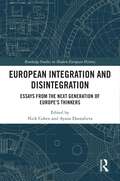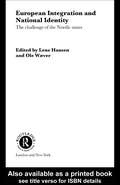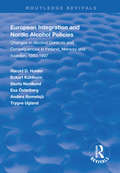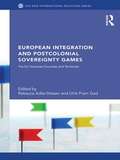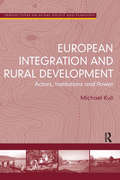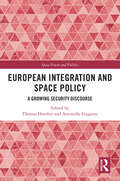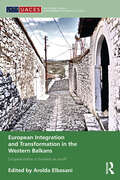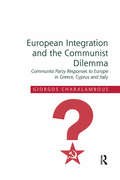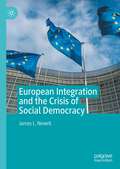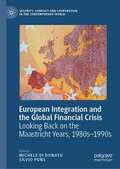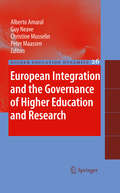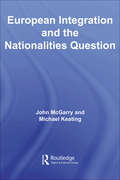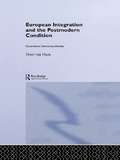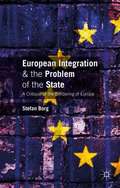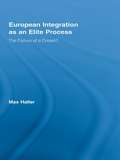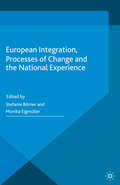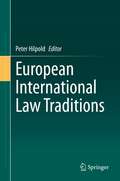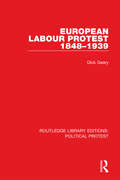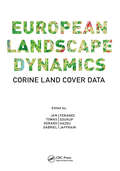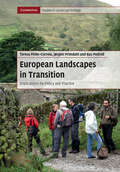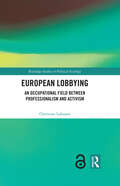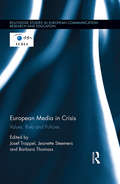- Table View
- List View
European Integration and Disintegration: Essays from the Next Generation of Europe's Thinkers (Routledge Studies in Modern European History)
by Nick CohenEuropean integration is an ambitious goal that attempts to reconcile grandiose visions for the future of Europe with complicated national attitudes toward unity. The added complexity of political crises, which have characterized the European project from its outset, makes the success of the European Union far from guaranteed. Today, European unity is once again at an existential crossroad, with internal and external challenges threatening its integration. This volume uniquely brings together the novel perspectives of Europe’s emergent generation of thinkers to analyze through interdisciplinary lenses these various disintegrative pressures. Students and scholars of Europe as well as those interested in the future of European cohesion will enjoy this volume, both for the interdisciplinary analysis it brings forth and for the window it provides into the thinking of Europe’s next generation of leaders.
European Integration and National Identity: The Challenge of the Nordic States (New International Relations)
by Lene Hansen Ole WæverThe four Nordic countries, Denmark, Finland, Sweden and Norway, have all held referenda on their relationship to the European Union in the 1990's. These referenda catalysed heated debates: should Finland and Sweden give up neutrality? Should Denmark follow the European Union's move towards higher degrees of integration? And, had there been enough change in Norway to reverse the rejection of European Community membership in 1972?These key questions about the future of European integration are addressed in this highly topical book by examining the crucial role played by national identity.
European Integration and Nordic Alcohol Policies: Changes in Alcohol Controls and Consequences in Finland, Norway and Sweden, 1980-97 (Routledge Revivals)
by Trygve Ugland Harold D. Holder Eckart Kühlhorn Sturla Nordlund Esa Österberg Andres RomelsjöFirst published in 1998, this volume constitutes a fascinating analysis of the clash of the alcohol control systems of three Nordic countries – Finland, Norway and Sweden – with the free-market of the European Union. It examines of the impact of joining the EU and of remaining outside the trade area, providing a detailed review from a number of perspectives that will interest not only alcohol experts but all social scientists, along with all those interested in links and conflicts between public health interests, market forces and trade agreements. Topics discussed include national systems of alcohol production and distribution, taxation, retail prices, patterns of alcohol consumption, economic actors, social and health consequences and changes in attitudes to alcohol policy in the Nordic countries.
European Integration and Postcolonial Sovereignty Games: The EU Overseas Countries and Territories (New International Relations)
by Rebecca Adler-Nissen Ulrik Pram GadThis book examines how sovereignty works in the context of European integration and postcolonialism. Focusing on a group of micro-polities associated with the European Union, it offers a new understanding of international relations in the context of modern sovereignty. This book offers a systematic and comparative analysis of the Overseas Countries and Territories (OCTs), the EU and the four affected Member States: UK, France, the Netherlands and Denmark. Contributors explore how states and state-like entities play ‘sovereignty games’ to understand how a group of postcolonial entities may strategically use their ambiguous status in relation to sovereignty. The book examines why former colonies are seeking greater room to manoeuvre on their own, whilst simultaneously developing a close relationship to the supranational EU. Methodologically sophisticated, this interdisciplinary volume combines interviews, participant observation, textual, legal and institutional analysis for a new theoretical approach to understanding the strategic possibilities and subjectivity of non-sovereign entities in international politics. Bringing together research on European integration and postcolonial theory, European Integration and Postcolonial Sovereignty Games will be of interest to students and scholars of International Relations, EU studies, Postcolonial studies, International Law and Political Theory.
European Integration and Rural Development: Actors, Institutions and Power (Perspectives On Rural Policy And Planning Ser.)
by Michael KullTo understand fully the process of European integration, it is necessary to consider developments at the sub-national and local level. EU integration scholars have been examining the local level using the concept of multi-level governance (MLG) since the 1990s. While MLG was the first concept to scrutinize the position of local levels of public administration and other actors within the EU polity, it overestimates the degree of influence it ascribes to local levels, particularly as far as the rural is concerned. Focusing on Germany and Finland, with country specific information from all EU member states, this book combines MLG with the concept of structural constructivism, in order to reveal some of the hidden aspects of EU integration. Bringing together these concepts and methodologies and replacing mainstream theories of integration with this new approach, offers a more accurate picture of multi-level interaction in rural policy and of the impacts of European integration at the local level. By examining the Community Initiative LEADER+ and setting this within a discussion of the state and structure of rural development policy, this book looks at the challenges, opportunities and policy options which are available and have been implemented in rural development. It shows that these are often context dependent and that the future of rural development policies, their shape and institutional configuration depend on reforms put in place at all levels of governance. Finally, it argues that the MLG of rural development policy must be built with people who have the know-how and the (local) knowledge to implement development projects and who have made LEADER a success in the past.
European Integration and Space Policy: A Growing Security Discourse (Space Power and Politics)
by Thomas Hoerber and Antonella ForganniThis volume addresses developments in European space policy and its significance for European integration, using discourse theory as a framework. It seeks to address the developments in European space policy by examining several sensitive security questions linked in general with space activities, on the one hand, and the interplay between space policy and security policy in the European Union (EU) on the other. The book argues that defence and security matters should be studied for a better understanding of space projects in their historical, political, economic, legal and social context. The volume seeks to answer the following key questions: • What can space policy contribute to European identity formation and the integration process? • What are the interests of member states/EU institutions in space? • How is space policy perceived by European institutions, and how have they been engaged in the policy process to promote activity in space? • In which ways is the EU engaged in space, in terms of policy areas, e.g. foreign policy, industrial policy, security and defence policies? • What is the impact of institutions on the policy-making process in European space policy? This book will be of interest to students of EU policy, space policy, discourse studies and International Relations in general.
European Integration and Transformation in the Western Balkans: Europeanization or Business as Usual? (Routledge/UACES Contemporary European Studies)
by Arolda ElbasaniThe book investigates the scope and limitations of the transformative power of EU enlargement in the Western Balkans. The extension of EU enlargement policy to the region has generated high expectations that enlargement will regulate democratic institution-building and foster reform, much as it did in Central and Eastern Europe. However, there is very little research on whether and how unfavourable domestic conditions might mitigate the transformative power of the EU. This volume investigates the role of domestic factors, identifying ‘stateness’ as the missing link between the assumed transformative power of the EU and the actual capacity to adopt EU rules across the region. Including chapters on Croatia, Serbia, Macedonia, Albania, Kosovo, and Bosnia-Herzegovina, leading scholars in the field offer up-to-date comparative analysis of key areas of institutional and policy reform; including state bureaucracy, rule of law, electoral management, environmental governance, cooperation with the International Court of Justice, economic liberalization and foreign policy. Looking to the future and the implications for policy change, European Integration and Transformation in the Western Balkans provides a new theoretical and empirical focus on this little understood area. The book will be of interest to scholars and students of EU politics, comparative democratisation, post-communist transitions and Balkan area studies.
European Integration and the Atlantic Community in the 1980s
by Kenneth Weisbrode Kiran Klaus PatelThis unique collection of essays lays the groundwork for the study of the intersection of European integration and transatlantic relations in the 1980s. With archives for this period only recently being opened, scholars are beginning to analyse and understand what some have called a peak moment in the European project and others have called the Second Cold War. How do these moments intersect and relate to one another? These essays, by prominent scholars from Europe and the United States, examine these and related questions while challenging the '1980s' itself as a useful demarcation for historical analysis.
European Integration and the Communist Dilemma: Communist Party Responses to Europe in Greece, Cyprus and Italy
by Giorgos CharalambousEuropean Integration and the Communist Dilemma assesses the response of communist parties to European integration using three contrasting and comparatively significant case studies from Greece, Cyprus and Italy. These parties, in common with other radical parties in Europe, face a continuing strategic dilemma with regard to Europe through which larger questions about communist ideology and identity can be illuminated. Exploring the tendency of communist parties to face a trade-off between domestic legitimacy and electoral concerns, and their nature as parties professing opposition to the systemic currents of capitalism and European integration, the author provides a fascinating study of the nuances in deciding whether to adopt ideological consistency or undergo moderation. Blending advances in party politics, communist history and Europeanization research, the book devises a framework that overcomes the deficiencies of uni-dimensional approaches to the study of parties and Europe. In this manner, wider insights on the national party politics of European integration are drawn.
European Integration and the Crisis of Social Democracy
by James L. NewellThis is a book about European integration and mainstream parties of the left, the main underlying question driving it being: Given that the communist left was fatally wounded by the collapse of the Berlin Wall; given that, since then, the terms ‘left’ and ‘right’ have not infrequently been attacked (especially by populists) as being no longer useful for making sense of politics; given that social democracy, understood as ‘national Keynesianism’ no longer appears to be viable (as reflected in its long-term electoral decline), what does it mean to be on the left in the early 21st century and what can be done to revive its fortunes? Its answer is that being on the left means embracing principles of equality and international solidarity, and that since the nation state is too small to respond effectively to climate change and the other most pressing issues of the present, no viable strategy for left-wing revival in Europe can dispense with European integration as a central element, of which European democratisation is a core component.
European Integration and the Global Financial Crisis: Looking Back on the Maastricht Years, 1980s–1990s (Security, Conflict and Cooperation in the Contemporary World)
by Silvio Pons Michele Di DonatoOffering a fresh take on a crucial phase of European history, this book explores the years between the 1980s and 1990s when the European Union took shape. Whilst contributing to existing literature on the Maastricht Treaty and European integration at the end of the twentieth century, the book also brings those debates into the twenty-first century and makes connections with longer-term issues. The transformation of the European political climate in the wake of the global financial crisis in 2008, and the watershed Brexit vote in 2016, has made it all the more urgent to reconsider the way scholars and opinion-makers have looked at European integration in the past. Drawing from recently released archival documents, the authors analyse European cooperation as part of the broader international history in which it unfolded, taking into account the changes in the Cold War order and the advance of a new phase of globalisation. Comparing and contrasting the debates, objectives and achievements of the 1980s and 1990s with the current political landscape of the European Union, this book proposes a novel interpretation of the choices that were made during the Maastricht years, and of their longer-term consequences.
European Integration and the Governance of Higher Education and Research
by Guy Neave Peter Maassen Christine Musselin Alberto AmaralThe present volume aims at analysing the change process which the European university is undergoing as a consequence of European integration efforts. In the case of higher education, these have materialised, amongst other things, in the implementation of the Bologna process, while the Lisbon summit also has important consequences for the university. Given the overall ambitions and goals of the Lisbon agenda and the Bologna process, and other relevant supranational and intergovernmental European integration processes, it is obvious that these processes have the intention to affect the university in all its basic structural features, including the way it performs its basic activities. However, the European Commission does not have a formal authority with respect to the university, nor did the governments that signed the Bologna process develop an executive administrative capacity for implementing the Bologna Declaration. As a consequence, whether and how the supranational and intergovernmental European integration processes actually affect university governance and the university as a social institution, is far from clear. This book discusses the nature and possible effects of these very complex processes by analysing the many facets and levels of higher education policy making in the European Union and a number of case studies that focus on the responses of higher education systems to external pressures for change originating from the integration process.
European Integration and the Nationalities Question (Routledge Innovations in Political Theory #Vol. 21)
by Michael Keating John McGarryA highly topical examination of the effect of European integration on relations between states and minority nations. This new collection brings together the leading specialists in the field, and covers a wide range of cases, from Northern Ireland in the West, to Estonia and Latvia in the East, and Cyprus in the South-East. The contributors assess how European integration has affected the preparedness of states to accommodate minorities across a range of fundamental criteria, including: enhanced rights protection; autonomy; the provision of a voice for minorities in the European and international arena; and the promotion of cross-border cooperation among communities dissected by state frontiers. The comprehensive chapters stress the importance of the nationality question, and the fact that, contrary to the hopes and beliefs of many on the left and right, it is not going to go away. Beginning with an introductory essay that summarizes the impact of European integration on the nationalities question, this accessible book will be of strong interest to scholars and researchers of politics, nationalism, ethnic conflict and European studies.
European Integration and the Postmodern Condition: Governance, Democracy, Identity (Routledge Advances in European Politics)
by Peter Van HamThis is the first book to look at the process of European integration by drawing on both established and new trends in postmodern thinking and analysis. The book asks how we can study the process of European integration in the current climate, and maps out the central elements of the academic debate dealing with the future of integration, and 'Europe' in general. The author stimulates fresh readings of the European issue, encouraging the development of new analytical horizons. This is a significant cutting-edge contribution to debates in politics, comparative politics and European studies.
European Integration and the Problem of the State
by Stefan BorgThis study argues that the practices of European integration reproduce, rather than transcend, the practices of modern statecraft. Therefore, the project of European integration is plagued by similar ethico-political dilemmas as the modern state, and is ultimately animated by a similar desire to either expel or interiorize difference.
European Integration as an Elite Process: The Failure of a Dream? (Routledge Advances in Sociology #Vol. 40)
by Max HallerMax Haller's impressive book presents an analysis of the process of European integration which keeps the relation between elites and citizens at the forefront. It is shown on the basis of new empirical data (surveys, interviews, analyses of documents and biographies) that European integration has been led since the beginning by the elites and that today there exists a considerable split between elites and citizens; this split is becoming more profound in the course of time. The book covers the following themes: - the structure, interests and behaviour of the different elites (political, economic, bureaucratic) - the expectations and perceptions of the populations concerning the integration process and the elites - the strategies of the elites to win the consent of the people, in view of widespread scepticism - proposals for reform of the EU, especially with regard to a strengthening of democratic elements which could reduce the split between elites and citizens. A timely and original read, this book will be a useful addition to the library of any political sociologist, political scientist or scholar of European integration.
European Integration, Processes of Change and the National Experience
by Stefanie Börner Monika EigmüllerIn order to better understand processes of European integration, this book offers a new perspective that compares past experiences of change to current transitional moments at the European level. It addresses key questions about European society, EU integration and social change to reveal the social construction of emergent polities and societies.
European Integration, Processes of Change and the National Experience (Palgrave Studies in European Political Sociology)
by Stefanie Börner Monika EigmüllerEuropean Integration, Processes of Change and the National Experience.
European Integration, Processes of Change and the National Experience (Palgrave Studies in European Political Sociology)
by Stefanie Börner Monika EigmüllerIn order to better understand processes of European integration, this book offers a new perspective that compares past experiences of change to current transitional moments at the European level. It addresses key questions about European society, EU integration and social change to reveal the social construction of emergent polities and societies.
European International Law Traditions
by Peter HilpoldInternational Law is usually considered, at least initially, to be a unitary legal order that is not subject to different national approaches. Ex definition it should be an order that transcends the national, and one that merges national perspectives into a higher understanding of law. It gains broad recognition precisely because it gives expression to a common consensus transcending national positions.The reality, however, is quite different. Individual countries’ approaches to International Law, and the meanings attached to different concepts, often diverge considerably. The result is a lack of comprehension that can ultimately lead to outright conflicts.In this book, several renowned international lawyers engage in an enquiry directed at sorting out how different European nations have contributed to the development of International Law, and how various national approaches to International Law differ. In doing so, their goal is to promote a better understanding of theory and practice in International Law.
European Labour Protest 1848–1939 (Routledge Library Editions: Political Protest #7)
by Dick GearyThis book, first published in 1981, examines the issues inspiring working-class movements after 1848 in France, Germany and Britain, with some consideration also of Austria, Italy, Spain and Russia. It concentrates on the attitudes of the ordinary working men, rather than the ideologies and the leaders, and considers the many different forms and manifestations of their grievances and means of expression. What emerges is the complexity of the connection between economic circumstances and protest, and the existence of wide divergences of behaviour amongst the European working class.
European Landscape Dynamics: CORINE Land Cover Data
by Jan Tomas Gerard Gabriel Feranec Soukup Hazeu JaffrainFour unique pan-European CORINE Land Cover datasets—CLC1990, CLC2000, CLC2006, and CLC2012— and three datasets concerning changes between 1990 and 2012 have presented the first-ever opportunity to observe the European landscape by means of land cover and its change. This book brings together all these datasets to demonstrate the methods of identification, analysis and assessment of the European land cover and its changes that took place during the intervals of 1990–2000, 2000–2006, and 2006–2012. It provides examples in which CLC data plays a role in offering solutions to European environmental problems such as the monitoring of urban dynamics, land fragmentation, ecosystems mapping and assessment, and high nature value farmland characteristics. Existing environmental problems require new approaches, and European Landscape Dynamics: CORINE Land Cover Data indicates a set of outlooks for CLC data generation that produce more detailed levels of analysis and bottom-up approaches while addressing the relationship of CLC data to the Infrastructure for Spatial Information in Europe (INSPIRE). It also discusses the future of CLC data generation. A valuable resource of up-to-date information, it is useful to professionals such as scientists, territorial planners, and environmentalists as well as students of geosciences and all those who are interested in cognition of the European landscape, its changes and development.
European Landscapes in Transition: Implications for Policy and Practice (Cambridge Studies in Landscape Ecology)
by Jørgen Primdahl Bas Pedroli Teresa Pinto-CorreiaEuropean rural landscapes as we experience them today are the result of ongoing processes and interactions between nature and society. These are changing fast: the future landscapes will be different from those we know currently. Written for academics, policy-makers and practitioners, this book is the first to explore the complex histories of rural landscapes in Europe as a basis for their sound governance in future. Tensions between the needs of agricultural spaces driven by economic incentives and a variety of non-agricultural functions are explored to demonstrate current challenges and the shortfalls in the policies that address them. Using inspiring case studies that highlight the roles of regional agents and communities, the authors go further than the usual analyses to illustrate the importance of local context. Written by experts currently working to revitalise the rural landscapes of Europe, the text concludes with suggestions for improving landscape policy and planning practice.
European Lobbying: An Occupational Field between Professionalism and Activism (Routledge Studies in Political Sociology)
by Christian LahusenLobbying is an integral part of the political reality of the European Union and a highly competitive and dynamic field of interest groups. This book takes a systematic look at lobbyists in order to broaden our understanding of the staff entrusted with the responsibility of influencing European politics. Who are the European lobbyists? What are their professional backgrounds, career patterns, practices and beliefs? The study uses a sociological framework to explore the professionalisation and professionalism of the field across national proveniences, policy fields and interest groups, and develops a systematic analysis that considers three different dimensions: occupational patterns, shared knowledge and common convictions . Based on original research that combines in-depth interviews with survey data, European Lobbying demonstrates that European lobbying is a firmly established and highly professionalised métier. In an organisational field characterised by growth, pluralisation and increasing competition, the professional staff contributes to the homogenisation of European lobbying and the marginalisation of other, non-professionalised forms of interest representation. It will therefore appeal to scholars and students of sociology and politics with interest in European studies, EU politics and the sociology of the professions.
European Media in Crisis: Values, Risks and Policies (Routledge Studies in European Communication Research and Education)
by Josef Trappel Jeanette Steemers Barbara ThomassWhen the financial markets collapsed in 2008, the media industry was affected by a major slump in advertising revenues, and a formerly highly successful business model fell into a state of decay. This economic crisis has threatened core social values of contemporary democracies, such as freedom, diversity and equality. Taking a normative and policy perspective, this book discusses threats and opportunities for the media industry in Europe: What are the implications of the crisis for professional journalism, the media industry, and the process of political communication? Can non- state and non-market actors profit from the crisis? And what are media policy answers at the national and European level?
